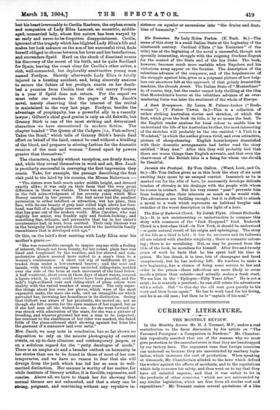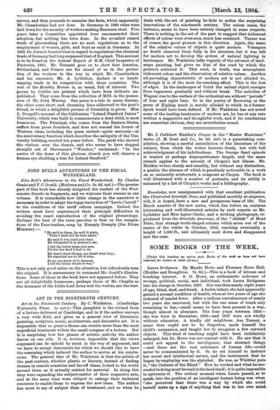THE MONTHLY REVIEW.
In the Monthly Review Mr. ii. J. Tennant, M.P., makes a real contribution to the fiscal discussion by his article on "The Favoured Foreigner : a Comparison in Burdens." Mr. Chamber- lain repeatedly asserted that one of the reasons why we must give protection to the manufacturers is that they are handicapped by our factory laws. The argument runs that foreign countries can undersell us because they are unrestricted by sanitary legis- lation, which increases the cost of production. When speaking at Greenock, Mr. Chamberlain alluded to the laws which defend the worker against the effects of accidents, and to the regulations which help to secure his safety, and then went on to say that they have all entailed expense, and that it was unfair to let in the products of other countries "which are not surrounded by any similar legislation, which are free from all similar cost and expenditure." Mr. Tennant makes several quotations of a like nature, and then proceeds to examine the facts, which apparently Mr. Chamberlain had not done. In Germany in 1890 rules were laid down for the security of workers making Bessemer steel. Five years later a Committee appointed here recommended their adoption, but nothing has been done. In the so-called ruined trade of glass making there are no such regulations as to the employment of women, girls, and boys as exist in Germany. In 1895 Dr. Jurisch boasted that in regard to regulations the chemical trade of Germany had long surpassed that of England. This account is to be found in the Annual Report of H.M. Chief Inspector of Factories, 1895. Mr. Tennant goes on to show that America, Switzerland, and France are far ahead of us in the protec- tion of the workers in the way in which Mr. Chamberlain and his successor, Mr. A. Lyttelton, declare is so handi- capping trade in its competition with those countries. The rest of the Monthly Review is, as usual, full of interest. Two poems by Crabbe are printed which have been hitherto un- published. They come from the collection of MSS. in the posses- sion of Mr. John Murray. One poem is a tale in many stanzas, the other some short and charming lines addressed to the poet's friend, in which a delightful picture of friendship is given. Miss L. Dougall's account of the Californian "Leland Stanford Junior" University, which was built to commemorate a dead child, is most humorous. The Principal, who comes from the Eastern States, suffers from pious founders, and does not conceal his horror of Western ideas, including the poem recited—quite seriously—at the anniversary function which describes the antiquity of the Uni- versity building, erected ten years before. The guide who showed the visitors over the church, and who seems to have stepped straight out of Stevenson's "Wrecker," exclaimed : "In the centre of the dome of this glorious church you will observe a human eye shedding a tear for Leland Stanford."











































 Previous page
Previous page